Constitutional and Administrative Law: Brexit's Impact on Sovereignty
VerifiedAdded on 2022/12/30
|10
|3550
|71
Homework Assignment
AI Summary
This assignment delves into the intricate relationship between Brexit and Parliamentary Sovereignty within the framework of Constitutional and Administrative Law. Section A addresses the core concept of Parliamentary Sovereignty, providing definitions, case law examples (including R (Jackson) v Attorney General), and an analysis of the roles of the Courts in upholding both the Rule of Law and Parliamentary Sovereignty. It further examines the effects of joining the European Union on Parliamentary Sovereignty and evaluates whether Brexit has truly increased it, referencing the Miller cases (2017 and 2019). Section B assesses understanding of constitutional principles through multiple-choice questions, requiring concise explanations of the chosen answers, including the principles of constitutionalism, the Entick and Carrington case, and the differences between laws and constitutional conventions.
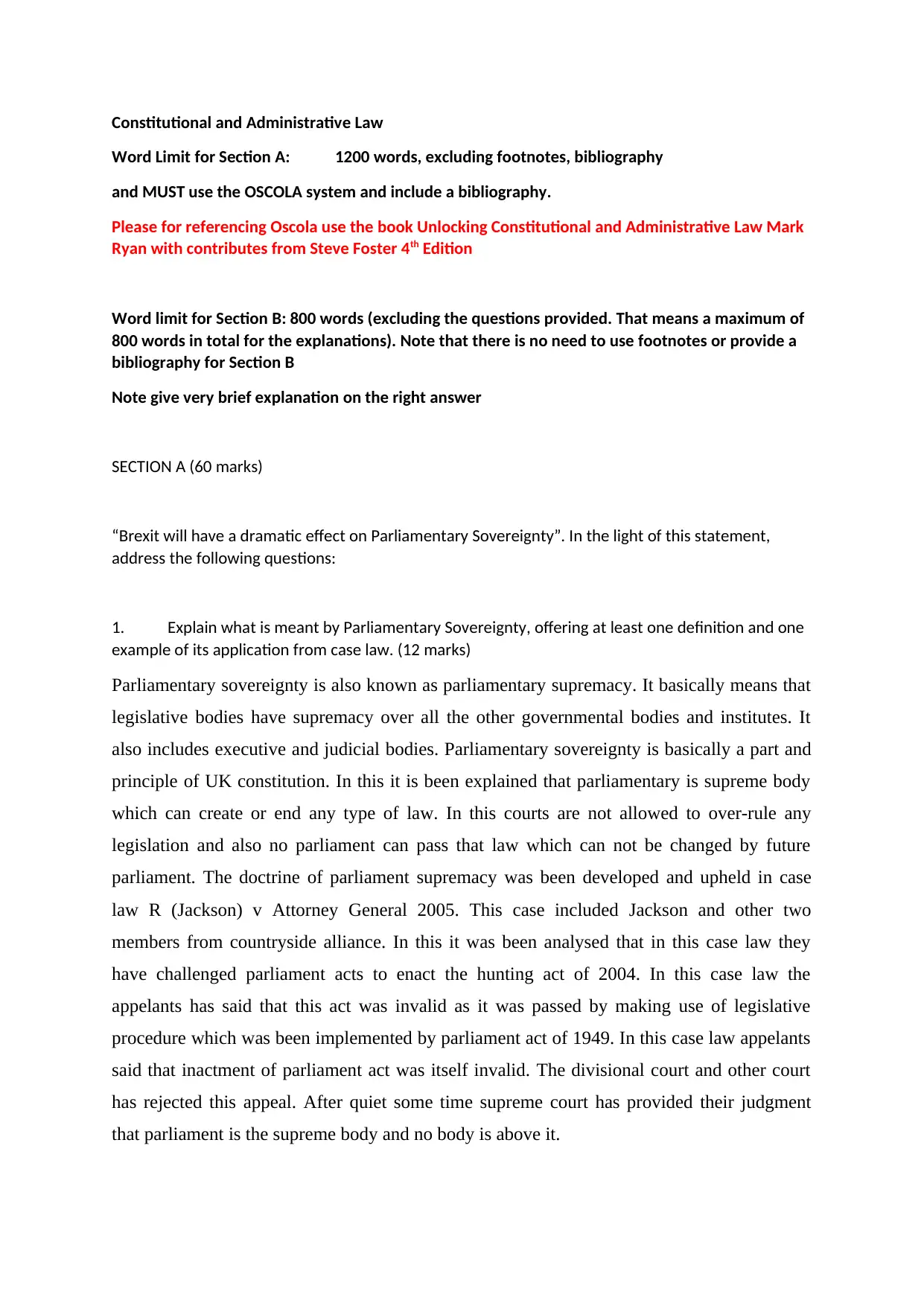
Constitutional and Administrative Law
Word Limit for Section A: 1200 words, excluding footnotes, bibliography
and MUST use the OSCOLA system and include a bibliography.
Please for referencing Oscola use the book Unlocking Constitutional and Administrative Law Mark
Ryan with contributes from Steve Foster 4th Edition
Word limit for Section B: 800 words (excluding the questions provided. That means a maximum of
800 words in total for the explanations). Note that there is no need to use footnotes or provide a
bibliography for Section B
Note give very brief explanation on the right answer
SECTION A (60 marks)
“Brexit will have a dramatic effect on Parliamentary Sovereignty”. In the light of this statement,
address the following questions:
1. Explain what is meant by Parliamentary Sovereignty, offering at least one definition and one
example of its application from case law. (12 marks)
Parliamentary sovereignty is also known as parliamentary supremacy. It basically means that
legislative bodies have supremacy over all the other governmental bodies and institutes. It
also includes executive and judicial bodies. Parliamentary sovereignty is basically a part and
principle of UK constitution. In this it is been explained that parliamentary is supreme body
which can create or end any type of law. In this courts are not allowed to over-rule any
legislation and also no parliament can pass that law which can not be changed by future
parliament. The doctrine of parliament supremacy was been developed and upheld in case
law R (Jackson) v Attorney General 2005. This case included Jackson and other two
members from countryside alliance. In this it was been analysed that in this case law they
have challenged parliament acts to enact the hunting act of 2004. In this case law the
appelants has said that this act was invalid as it was passed by making use of legislative
procedure which was been implemented by parliament act of 1949. In this case law appelants
said that inactment of parliament act was itself invalid. The divisional court and other court
has rejected this appeal. After quiet some time supreme court has provided their judgment
that parliament is the supreme body and no body is above it.
Word Limit for Section A: 1200 words, excluding footnotes, bibliography
and MUST use the OSCOLA system and include a bibliography.
Please for referencing Oscola use the book Unlocking Constitutional and Administrative Law Mark
Ryan with contributes from Steve Foster 4th Edition
Word limit for Section B: 800 words (excluding the questions provided. That means a maximum of
800 words in total for the explanations). Note that there is no need to use footnotes or provide a
bibliography for Section B
Note give very brief explanation on the right answer
SECTION A (60 marks)
“Brexit will have a dramatic effect on Parliamentary Sovereignty”. In the light of this statement,
address the following questions:
1. Explain what is meant by Parliamentary Sovereignty, offering at least one definition and one
example of its application from case law. (12 marks)
Parliamentary sovereignty is also known as parliamentary supremacy. It basically means that
legislative bodies have supremacy over all the other governmental bodies and institutes. It
also includes executive and judicial bodies. Parliamentary sovereignty is basically a part and
principle of UK constitution. In this it is been explained that parliamentary is supreme body
which can create or end any type of law. In this courts are not allowed to over-rule any
legislation and also no parliament can pass that law which can not be changed by future
parliament. The doctrine of parliament supremacy was been developed and upheld in case
law R (Jackson) v Attorney General 2005. This case included Jackson and other two
members from countryside alliance. In this it was been analysed that in this case law they
have challenged parliament acts to enact the hunting act of 2004. In this case law the
appelants has said that this act was invalid as it was passed by making use of legislative
procedure which was been implemented by parliament act of 1949. In this case law appelants
said that inactment of parliament act was itself invalid. The divisional court and other court
has rejected this appeal. After quiet some time supreme court has provided their judgment
that parliament is the supreme body and no body is above it.
Paraphrase This Document
Need a fresh take? Get an instant paraphrase of this document with our AI Paraphraser
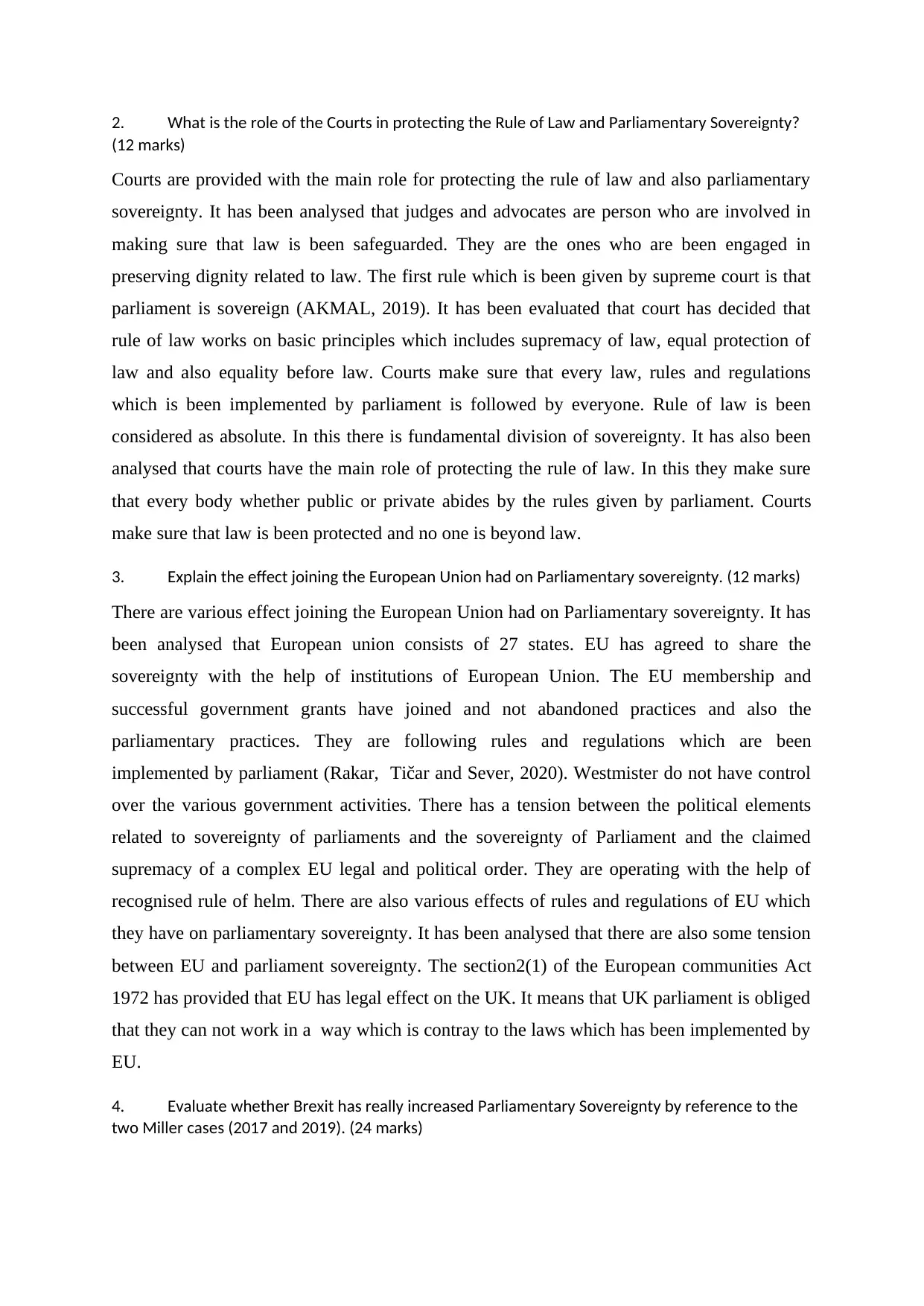
2. What is the role of the Courts in protecting the Rule of Law and Parliamentary Sovereignty?
(12 marks)
Courts are provided with the main role for protecting the rule of law and also parliamentary
sovereignty. It has been analysed that judges and advocates are person who are involved in
making sure that law is been safeguarded. They are the ones who are been engaged in
preserving dignity related to law. The first rule which is been given by supreme court is that
parliament is sovereign (AKMAL, 2019). It has been evaluated that court has decided that
rule of law works on basic principles which includes supremacy of law, equal protection of
law and also equality before law. Courts make sure that every law, rules and regulations
which is been implemented by parliament is followed by everyone. Rule of law is been
considered as absolute. In this there is fundamental division of sovereignty. It has also been
analysed that courts have the main role of protecting the rule of law. In this they make sure
that every body whether public or private abides by the rules given by parliament. Courts
make sure that law is been protected and no one is beyond law.
3. Explain the effect joining the European Union had on Parliamentary sovereignty. (12 marks)
There are various effect joining the European Union had on Parliamentary sovereignty. It has
been analysed that European union consists of 27 states. EU has agreed to share the
sovereignty with the help of institutions of European Union. The EU membership and
successful government grants have joined and not abandoned practices and also the
parliamentary practices. They are following rules and regulations which are been
implemented by parliament (Rakar, Tičar and Sever, 2020). Westmister do not have control
over the various government activities. There has a tension between the political elements
related to sovereignty of parliaments and the sovereignty of Parliament and the claimed
supremacy of a complex EU legal and political order. They are operating with the help of
recognised rule of helm. There are also various effects of rules and regulations of EU which
they have on parliamentary sovereignty. It has been analysed that there are also some tension
between EU and parliament sovereignty. The section2(1) of the European communities Act
1972 has provided that EU has legal effect on the UK. It means that UK parliament is obliged
that they can not work in a way which is contray to the laws which has been implemented by
EU.
4. Evaluate whether Brexit has really increased Parliamentary Sovereignty by reference to the
two Miller cases (2017 and 2019). (24 marks)
(12 marks)
Courts are provided with the main role for protecting the rule of law and also parliamentary
sovereignty. It has been analysed that judges and advocates are person who are involved in
making sure that law is been safeguarded. They are the ones who are been engaged in
preserving dignity related to law. The first rule which is been given by supreme court is that
parliament is sovereign (AKMAL, 2019). It has been evaluated that court has decided that
rule of law works on basic principles which includes supremacy of law, equal protection of
law and also equality before law. Courts make sure that every law, rules and regulations
which is been implemented by parliament is followed by everyone. Rule of law is been
considered as absolute. In this there is fundamental division of sovereignty. It has also been
analysed that courts have the main role of protecting the rule of law. In this they make sure
that every body whether public or private abides by the rules given by parliament. Courts
make sure that law is been protected and no one is beyond law.
3. Explain the effect joining the European Union had on Parliamentary sovereignty. (12 marks)
There are various effect joining the European Union had on Parliamentary sovereignty. It has
been analysed that European union consists of 27 states. EU has agreed to share the
sovereignty with the help of institutions of European Union. The EU membership and
successful government grants have joined and not abandoned practices and also the
parliamentary practices. They are following rules and regulations which are been
implemented by parliament (Rakar, Tičar and Sever, 2020). Westmister do not have control
over the various government activities. There has a tension between the political elements
related to sovereignty of parliaments and the sovereignty of Parliament and the claimed
supremacy of a complex EU legal and political order. They are operating with the help of
recognised rule of helm. There are also various effects of rules and regulations of EU which
they have on parliamentary sovereignty. It has been analysed that there are also some tension
between EU and parliament sovereignty. The section2(1) of the European communities Act
1972 has provided that EU has legal effect on the UK. It means that UK parliament is obliged
that they can not work in a way which is contray to the laws which has been implemented by
EU.
4. Evaluate whether Brexit has really increased Parliamentary Sovereignty by reference to the
two Miller cases (2017 and 2019). (24 marks)
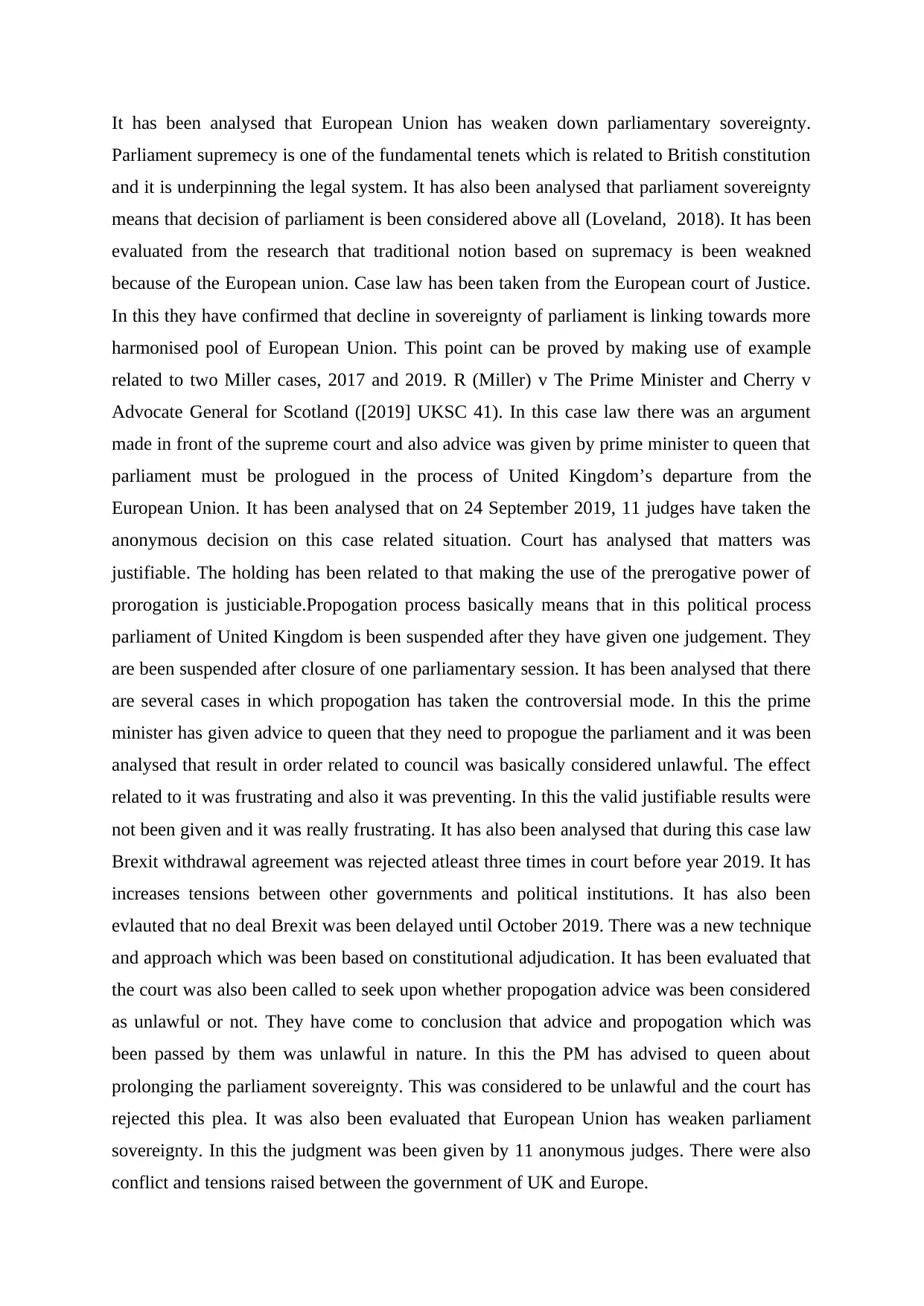
It has been analysed that European Union has weaken down parliamentary sovereignty.
Parliament supremecy is one of the fundamental tenets which is related to British constitution
and it is underpinning the legal system. It has also been analysed that parliament sovereignty
means that decision of parliament is been considered above all (Loveland, 2018). It has been
evaluated from the research that traditional notion based on supremacy is been weakned
because of the European union. Case law has been taken from the European court of Justice.
In this they have confirmed that decline in sovereignty of parliament is linking towards more
harmonised pool of European Union. This point can be proved by making use of example
related to two Miller cases, 2017 and 2019. R (Miller) v The Prime Minister and Cherry v
Advocate General for Scotland ([2019] UKSC 41). In this case law there was an argument
made in front of the supreme court and also advice was given by prime minister to queen that
parliament must be prologued in the process of United Kingdom’s departure from the
European Union. It has been analysed that on 24 September 2019, 11 judges have taken the
anonymous decision on this case related situation. Court has analysed that matters was
justifiable. The holding has been related to that making the use of the prerogative power of
prorogation is justiciable.Propogation process basically means that in this political process
parliament of United Kingdom is been suspended after they have given one judgement. They
are been suspended after closure of one parliamentary session. It has been analysed that there
are several cases in which propogation has taken the controversial mode. In this the prime
minister has given advice to queen that they need to propogue the parliament and it was been
analysed that result in order related to council was basically considered unlawful. The effect
related to it was frustrating and also it was preventing. In this the valid justifiable results were
not been given and it was really frustrating. It has also been analysed that during this case law
Brexit withdrawal agreement was rejected atleast three times in court before year 2019. It has
increases tensions between other governments and political institutions. It has also been
evlauted that no deal Brexit was been delayed until October 2019. There was a new technique
and approach which was been based on constitutional adjudication. It has been evaluated that
the court was also been called to seek upon whether propogation advice was been considered
as unlawful or not. They have come to conclusion that advice and propogation which was
been passed by them was unlawful in nature. In this the PM has advised to queen about
prolonging the parliament sovereignty. This was considered to be unlawful and the court has
rejected this plea. It was also been evaluated that European Union has weaken parliament
sovereignty. In this the judgment was been given by 11 anonymous judges. There were also
conflict and tensions raised between the government of UK and Europe.
Parliament supremecy is one of the fundamental tenets which is related to British constitution
and it is underpinning the legal system. It has also been analysed that parliament sovereignty
means that decision of parliament is been considered above all (Loveland, 2018). It has been
evaluated from the research that traditional notion based on supremacy is been weakned
because of the European union. Case law has been taken from the European court of Justice.
In this they have confirmed that decline in sovereignty of parliament is linking towards more
harmonised pool of European Union. This point can be proved by making use of example
related to two Miller cases, 2017 and 2019. R (Miller) v The Prime Minister and Cherry v
Advocate General for Scotland ([2019] UKSC 41). In this case law there was an argument
made in front of the supreme court and also advice was given by prime minister to queen that
parliament must be prologued in the process of United Kingdom’s departure from the
European Union. It has been analysed that on 24 September 2019, 11 judges have taken the
anonymous decision on this case related situation. Court has analysed that matters was
justifiable. The holding has been related to that making the use of the prerogative power of
prorogation is justiciable.Propogation process basically means that in this political process
parliament of United Kingdom is been suspended after they have given one judgement. They
are been suspended after closure of one parliamentary session. It has been analysed that there
are several cases in which propogation has taken the controversial mode. In this the prime
minister has given advice to queen that they need to propogue the parliament and it was been
analysed that result in order related to council was basically considered unlawful. The effect
related to it was frustrating and also it was preventing. In this the valid justifiable results were
not been given and it was really frustrating. It has also been analysed that during this case law
Brexit withdrawal agreement was rejected atleast three times in court before year 2019. It has
increases tensions between other governments and political institutions. It has also been
evlauted that no deal Brexit was been delayed until October 2019. There was a new technique
and approach which was been based on constitutional adjudication. It has been evaluated that
the court was also been called to seek upon whether propogation advice was been considered
as unlawful or not. They have come to conclusion that advice and propogation which was
been passed by them was unlawful in nature. In this the PM has advised to queen about
prolonging the parliament sovereignty. This was considered to be unlawful and the court has
rejected this plea. It was also been evaluated that European Union has weaken parliament
sovereignty. In this the judgment was been given by 11 anonymous judges. There were also
conflict and tensions raised between the government of UK and Europe.
⊘ This is a preview!⊘
Do you want full access?
Subscribe today to unlock all pages.

Trusted by 1+ million students worldwide
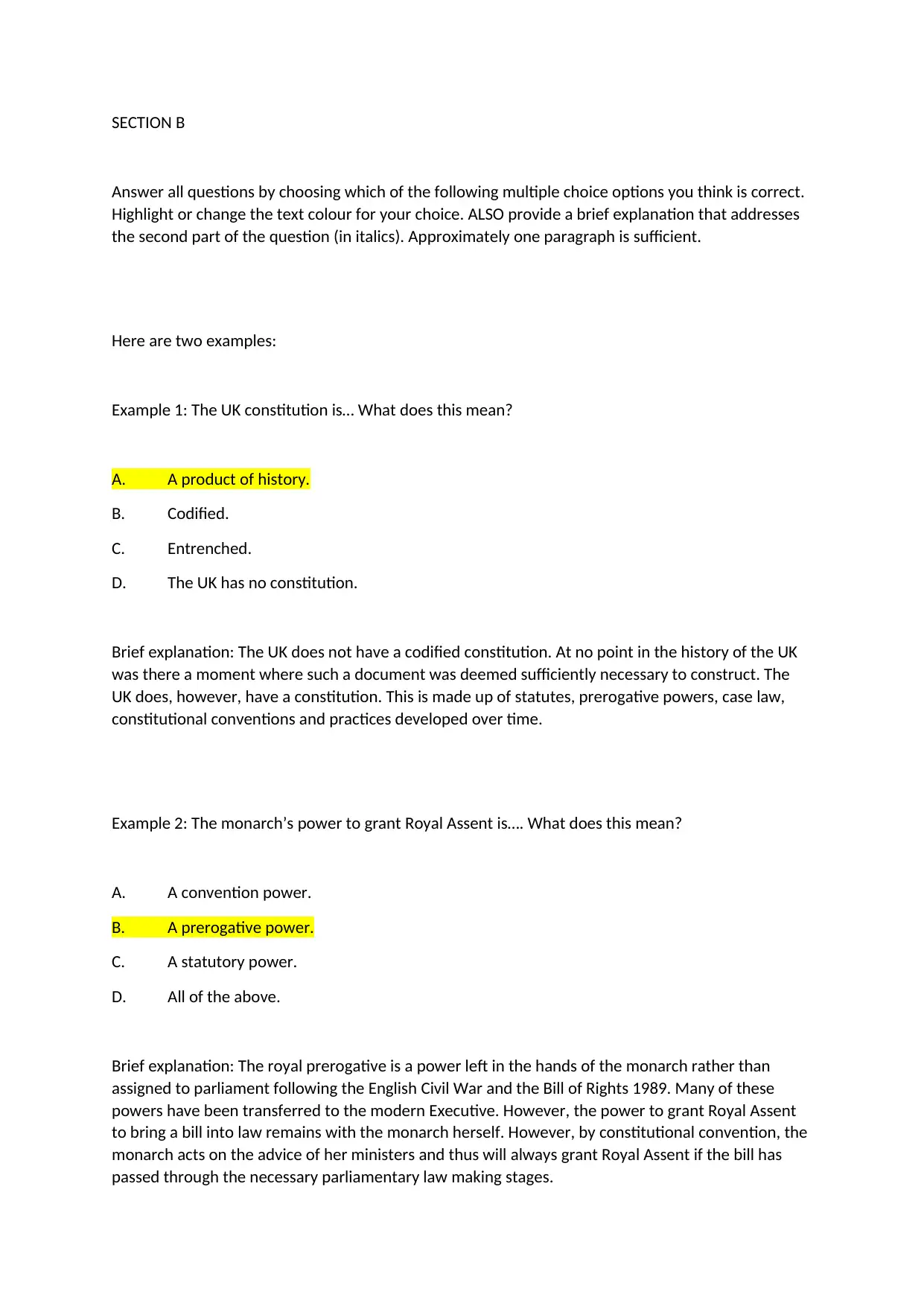
SECTION B
Answer all questions by choosing which of the following multiple choice options you think is correct.
Highlight or change the text colour for your choice. ALSO provide a brief explanation that addresses
the second part of the question (in italics). Approximately one paragraph is sufficient.
Here are two examples:
Example 1: The UK constitution is… What does this mean?
A. A product of history.
B. Codified.
C. Entrenched.
D. The UK has no constitution.
Brief explanation: The UK does not have a codified constitution. At no point in the history of the UK
was there a moment where such a document was deemed sufficiently necessary to construct. The
UK does, however, have a constitution. This is made up of statutes, prerogative powers, case law,
constitutional conventions and practices developed over time.
Example 2: The monarch’s power to grant Royal Assent is…. What does this mean?
A. A convention power.
B. A prerogative power.
C. A statutory power.
D. All of the above.
Brief explanation: The royal prerogative is a power left in the hands of the monarch rather than
assigned to parliament following the English Civil War and the Bill of Rights 1989. Many of these
powers have been transferred to the modern Executive. However, the power to grant Royal Assent
to bring a bill into law remains with the monarch herself. However, by constitutional convention, the
monarch acts on the advice of her ministers and thus will always grant Royal Assent if the bill has
passed through the necessary parliamentary law making stages.
Answer all questions by choosing which of the following multiple choice options you think is correct.
Highlight or change the text colour for your choice. ALSO provide a brief explanation that addresses
the second part of the question (in italics). Approximately one paragraph is sufficient.
Here are two examples:
Example 1: The UK constitution is… What does this mean?
A. A product of history.
B. Codified.
C. Entrenched.
D. The UK has no constitution.
Brief explanation: The UK does not have a codified constitution. At no point in the history of the UK
was there a moment where such a document was deemed sufficiently necessary to construct. The
UK does, however, have a constitution. This is made up of statutes, prerogative powers, case law,
constitutional conventions and practices developed over time.
Example 2: The monarch’s power to grant Royal Assent is…. What does this mean?
A. A convention power.
B. A prerogative power.
C. A statutory power.
D. All of the above.
Brief explanation: The royal prerogative is a power left in the hands of the monarch rather than
assigned to parliament following the English Civil War and the Bill of Rights 1989. Many of these
powers have been transferred to the modern Executive. However, the power to grant Royal Assent
to bring a bill into law remains with the monarch herself. However, by constitutional convention, the
monarch acts on the advice of her ministers and thus will always grant Royal Assent if the bill has
passed through the necessary parliamentary law making stages.
Paraphrase This Document
Need a fresh take? Get an instant paraphrase of this document with our AI Paraphraser
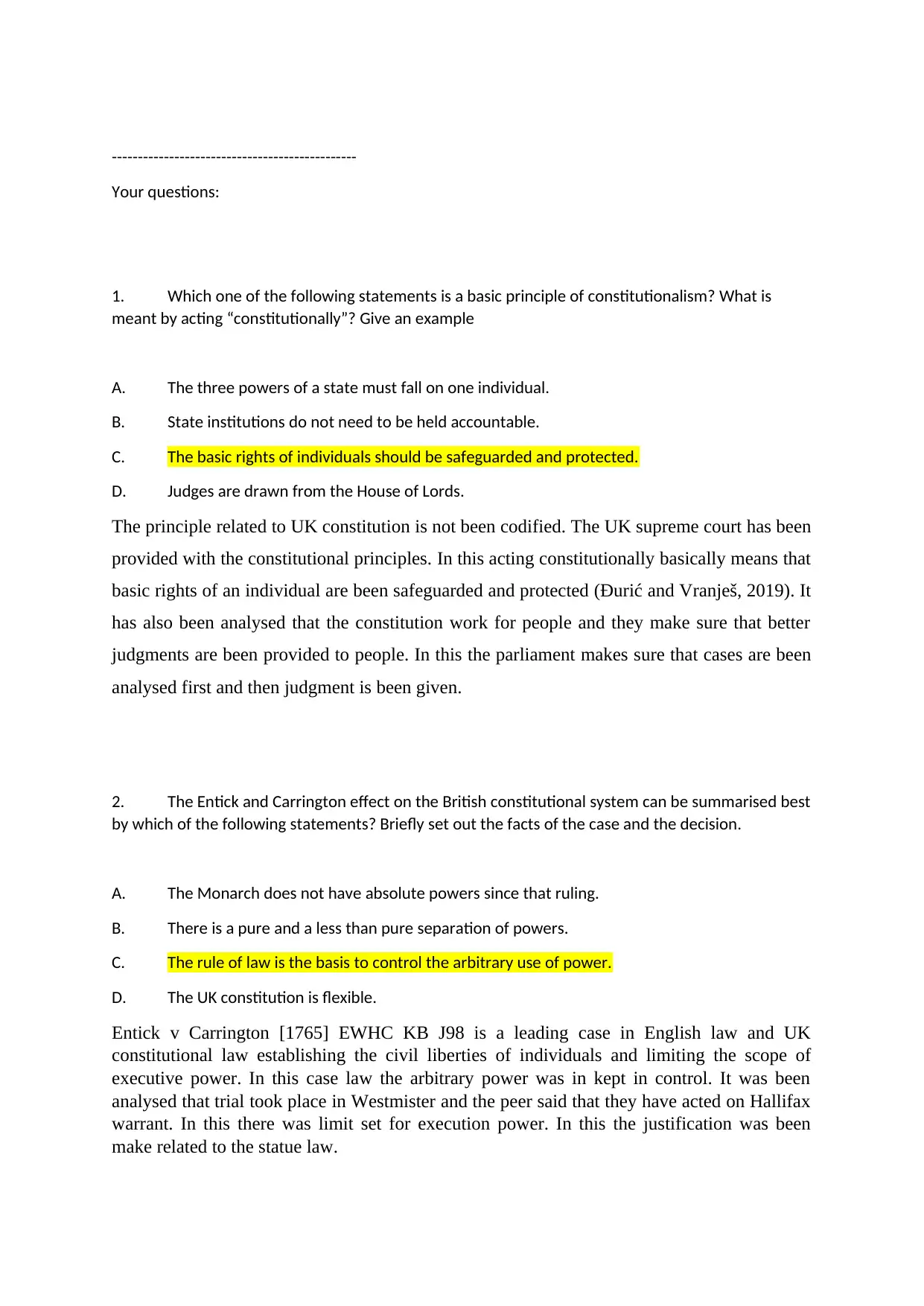
-----------------------------------------------
Your questions:
1. Which one of the following statements is a basic principle of constitutionalism? What is
meant by acting “constitutionally”? Give an example
A. The three powers of a state must fall on one individual.
B. State institutions do not need to be held accountable.
C. The basic rights of individuals should be safeguarded and protected.
D. Judges are drawn from the House of Lords.
The principle related to UK constitution is not been codified. The UK supreme court has been
provided with the constitutional principles. In this acting constitutionally basically means that
basic rights of an individual are been safeguarded and protected (Đurić and Vranješ, 2019). It
has also been analysed that the constitution work for people and they make sure that better
judgments are been provided to people. In this the parliament makes sure that cases are been
analysed first and then judgment is been given.
2. The Entick and Carrington effect on the British constitutional system can be summarised best
by which of the following statements? Briefly set out the facts of the case and the decision.
A. The Monarch does not have absolute powers since that ruling.
B. There is a pure and a less than pure separation of powers.
C. The rule of law is the basis to control the arbitrary use of power.
D. The UK constitution is flexible.
Entick v Carrington [1765] EWHC KB J98 is a leading case in English law and UK
constitutional law establishing the civil liberties of individuals and limiting the scope of
executive power. In this case law the arbitrary power was in kept in control. It was been
analysed that trial took place in Westmister and the peer said that they have acted on Hallifax
warrant. In this there was limit set for execution power. In this the justification was been
make related to the statue law.
Your questions:
1. Which one of the following statements is a basic principle of constitutionalism? What is
meant by acting “constitutionally”? Give an example
A. The three powers of a state must fall on one individual.
B. State institutions do not need to be held accountable.
C. The basic rights of individuals should be safeguarded and protected.
D. Judges are drawn from the House of Lords.
The principle related to UK constitution is not been codified. The UK supreme court has been
provided with the constitutional principles. In this acting constitutionally basically means that
basic rights of an individual are been safeguarded and protected (Đurić and Vranješ, 2019). It
has also been analysed that the constitution work for people and they make sure that better
judgments are been provided to people. In this the parliament makes sure that cases are been
analysed first and then judgment is been given.
2. The Entick and Carrington effect on the British constitutional system can be summarised best
by which of the following statements? Briefly set out the facts of the case and the decision.
A. The Monarch does not have absolute powers since that ruling.
B. There is a pure and a less than pure separation of powers.
C. The rule of law is the basis to control the arbitrary use of power.
D. The UK constitution is flexible.
Entick v Carrington [1765] EWHC KB J98 is a leading case in English law and UK
constitutional law establishing the civil liberties of individuals and limiting the scope of
executive power. In this case law the arbitrary power was in kept in control. It was been
analysed that trial took place in Westmister and the peer said that they have acted on Hallifax
warrant. In this there was limit set for execution power. In this the justification was been
make related to the statue law.
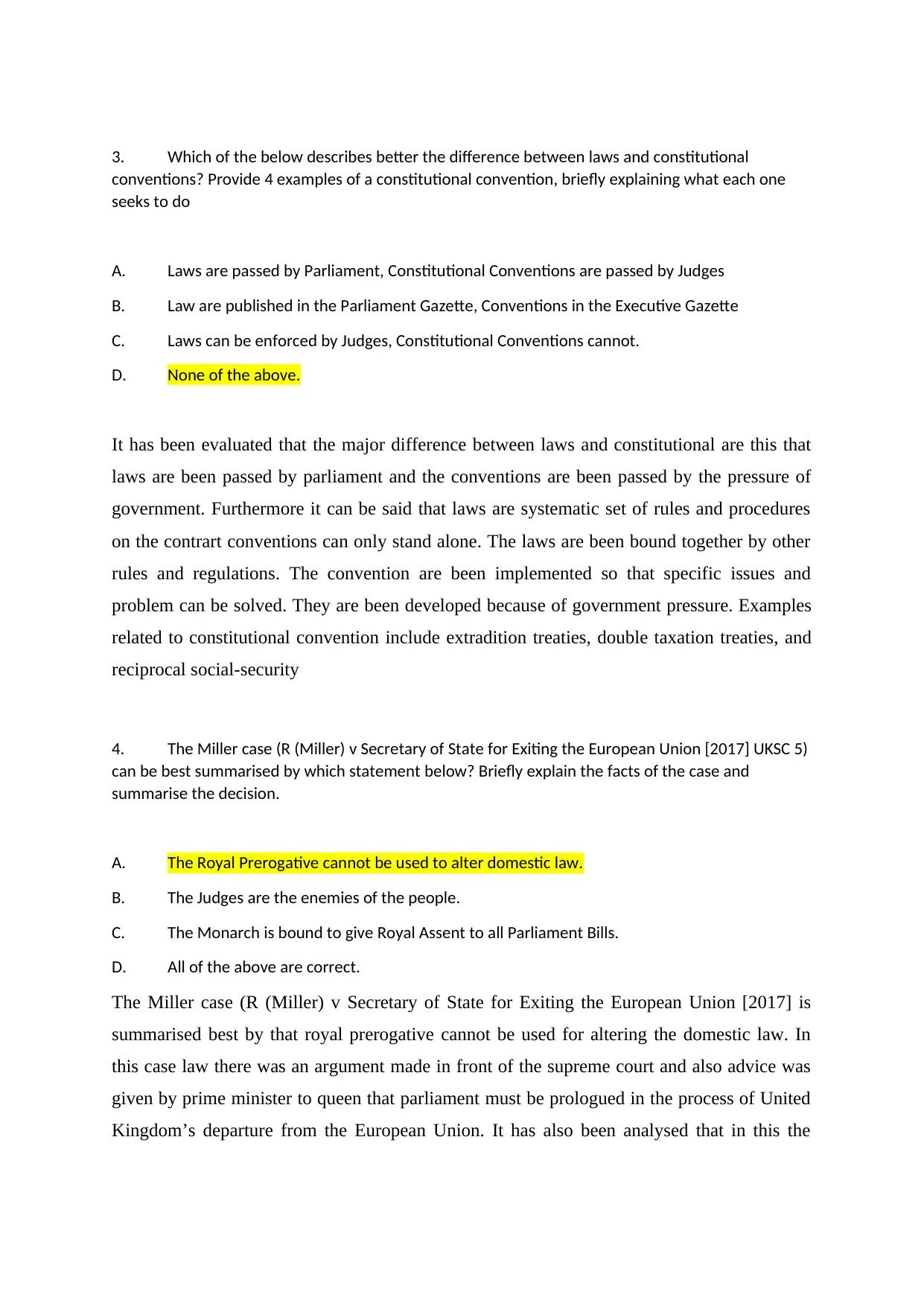
3. Which of the below describes better the difference between laws and constitutional
conventions? Provide 4 examples of a constitutional convention, briefly explaining what each one
seeks to do
A. Laws are passed by Parliament, Constitutional Conventions are passed by Judges
B. Law are published in the Parliament Gazette, Conventions in the Executive Gazette
C. Laws can be enforced by Judges, Constitutional Conventions cannot.
D. None of the above.
It has been evaluated that the major difference between laws and constitutional are this that
laws are been passed by parliament and the conventions are been passed by the pressure of
government. Furthermore it can be said that laws are systematic set of rules and procedures
on the contrart conventions can only stand alone. The laws are been bound together by other
rules and regulations. The convention are been implemented so that specific issues and
problem can be solved. They are been developed because of government pressure. Examples
related to constitutional convention include extradition treaties, double taxation treaties, and
reciprocal social-security
4. The Miller case (R (Miller) v Secretary of State for Exiting the European Union [2017] UKSC 5)
can be best summarised by which statement below? Briefly explain the facts of the case and
summarise the decision.
A. The Royal Prerogative cannot be used to alter domestic law.
B. The Judges are the enemies of the people.
C. The Monarch is bound to give Royal Assent to all Parliament Bills.
D. All of the above are correct.
The Miller case (R (Miller) v Secretary of State for Exiting the European Union [2017] is
summarised best by that royal prerogative cannot be used for altering the domestic law. In
this case law there was an argument made in front of the supreme court and also advice was
given by prime minister to queen that parliament must be prologued in the process of United
Kingdom’s departure from the European Union. It has also been analysed that in this the
conventions? Provide 4 examples of a constitutional convention, briefly explaining what each one
seeks to do
A. Laws are passed by Parliament, Constitutional Conventions are passed by Judges
B. Law are published in the Parliament Gazette, Conventions in the Executive Gazette
C. Laws can be enforced by Judges, Constitutional Conventions cannot.
D. None of the above.
It has been evaluated that the major difference between laws and constitutional are this that
laws are been passed by parliament and the conventions are been passed by the pressure of
government. Furthermore it can be said that laws are systematic set of rules and procedures
on the contrart conventions can only stand alone. The laws are been bound together by other
rules and regulations. The convention are been implemented so that specific issues and
problem can be solved. They are been developed because of government pressure. Examples
related to constitutional convention include extradition treaties, double taxation treaties, and
reciprocal social-security
4. The Miller case (R (Miller) v Secretary of State for Exiting the European Union [2017] UKSC 5)
can be best summarised by which statement below? Briefly explain the facts of the case and
summarise the decision.
A. The Royal Prerogative cannot be used to alter domestic law.
B. The Judges are the enemies of the people.
C. The Monarch is bound to give Royal Assent to all Parliament Bills.
D. All of the above are correct.
The Miller case (R (Miller) v Secretary of State for Exiting the European Union [2017] is
summarised best by that royal prerogative cannot be used for altering the domestic law. In
this case law there was an argument made in front of the supreme court and also advice was
given by prime minister to queen that parliament must be prologued in the process of United
Kingdom’s departure from the European Union. It has also been analysed that in this the
⊘ This is a preview!⊘
Do you want full access?
Subscribe today to unlock all pages.

Trusted by 1+ million students worldwide
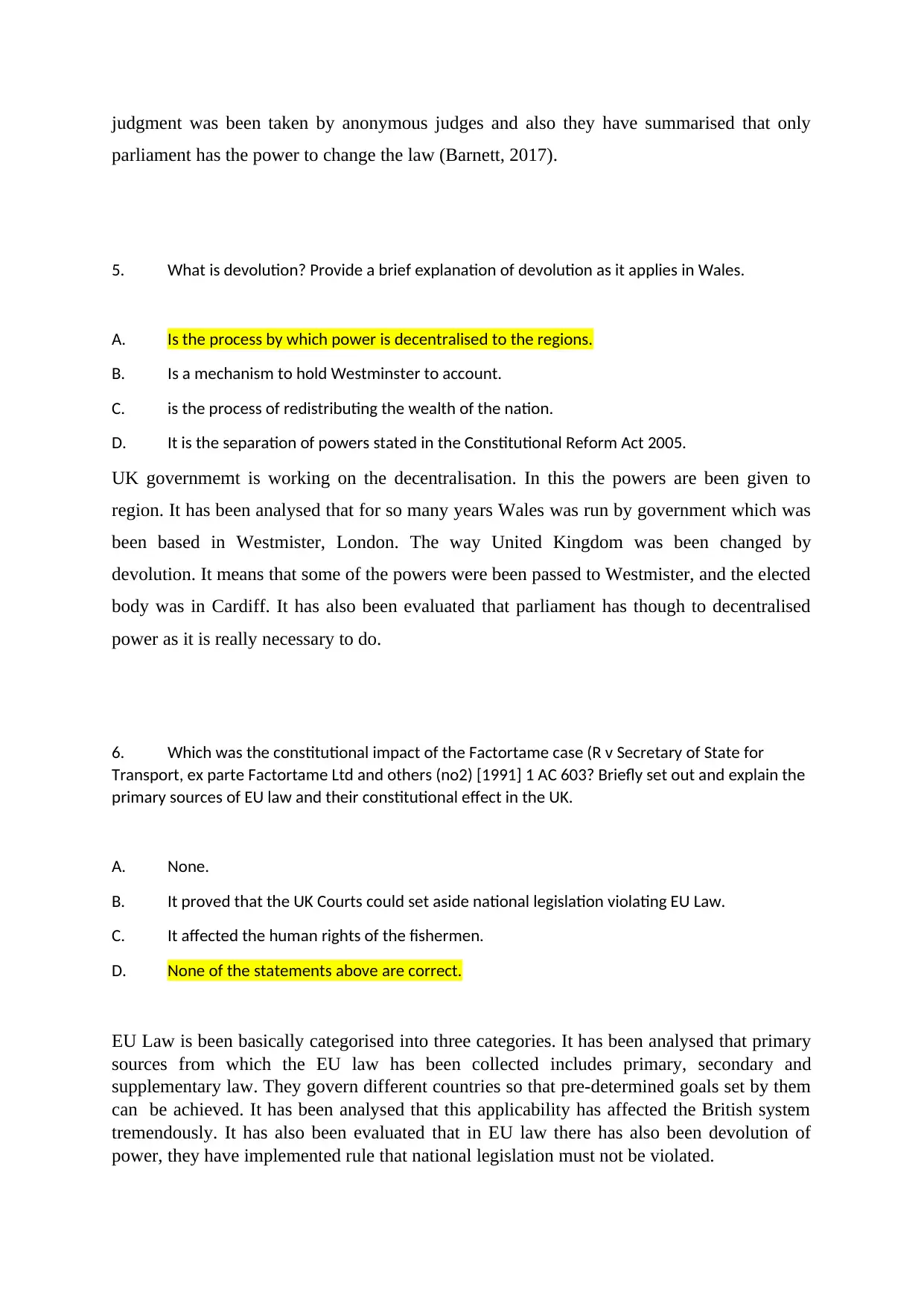
judgment was been taken by anonymous judges and also they have summarised that only
parliament has the power to change the law (Barnett, 2017).
5. What is devolution? Provide a brief explanation of devolution as it applies in Wales.
A. Is the process by which power is decentralised to the regions.
B. Is a mechanism to hold Westminster to account.
C. is the process of redistributing the wealth of the nation.
D. It is the separation of powers stated in the Constitutional Reform Act 2005.
UK governmemt is working on the decentralisation. In this the powers are been given to
region. It has been analysed that for so many years Wales was run by government which was
been based in Westmister, London. The way United Kingdom was been changed by
devolution. It means that some of the powers were been passed to Westmister, and the elected
body was in Cardiff. It has also been evaluated that parliament has though to decentralised
power as it is really necessary to do.
6. Which was the constitutional impact of the Factortame case (R v Secretary of State for
Transport, ex parte Factortame Ltd and others (no2) [1991] 1 AC 603? Briefly set out and explain the
primary sources of EU law and their constitutional effect in the UK.
A. None.
B. It proved that the UK Courts could set aside national legislation violating EU Law.
C. It affected the human rights of the fishermen.
D. None of the statements above are correct.
EU Law is been basically categorised into three categories. It has been analysed that primary
sources from which the EU law has been collected includes primary, secondary and
supplementary law. They govern different countries so that pre-determined goals set by them
can be achieved. It has been analysed that this applicability has affected the British system
tremendously. It has also been evaluated that in EU law there has also been devolution of
power, they have implemented rule that national legislation must not be violated.
parliament has the power to change the law (Barnett, 2017).
5. What is devolution? Provide a brief explanation of devolution as it applies in Wales.
A. Is the process by which power is decentralised to the regions.
B. Is a mechanism to hold Westminster to account.
C. is the process of redistributing the wealth of the nation.
D. It is the separation of powers stated in the Constitutional Reform Act 2005.
UK governmemt is working on the decentralisation. In this the powers are been given to
region. It has been analysed that for so many years Wales was run by government which was
been based in Westmister, London. The way United Kingdom was been changed by
devolution. It means that some of the powers were been passed to Westmister, and the elected
body was in Cardiff. It has also been evaluated that parliament has though to decentralised
power as it is really necessary to do.
6. Which was the constitutional impact of the Factortame case (R v Secretary of State for
Transport, ex parte Factortame Ltd and others (no2) [1991] 1 AC 603? Briefly set out and explain the
primary sources of EU law and their constitutional effect in the UK.
A. None.
B. It proved that the UK Courts could set aside national legislation violating EU Law.
C. It affected the human rights of the fishermen.
D. None of the statements above are correct.
EU Law is been basically categorised into three categories. It has been analysed that primary
sources from which the EU law has been collected includes primary, secondary and
supplementary law. They govern different countries so that pre-determined goals set by them
can be achieved. It has been analysed that this applicability has affected the British system
tremendously. It has also been evaluated that in EU law there has also been devolution of
power, they have implemented rule that national legislation must not be violated.
Paraphrase This Document
Need a fresh take? Get an instant paraphrase of this document with our AI Paraphraser
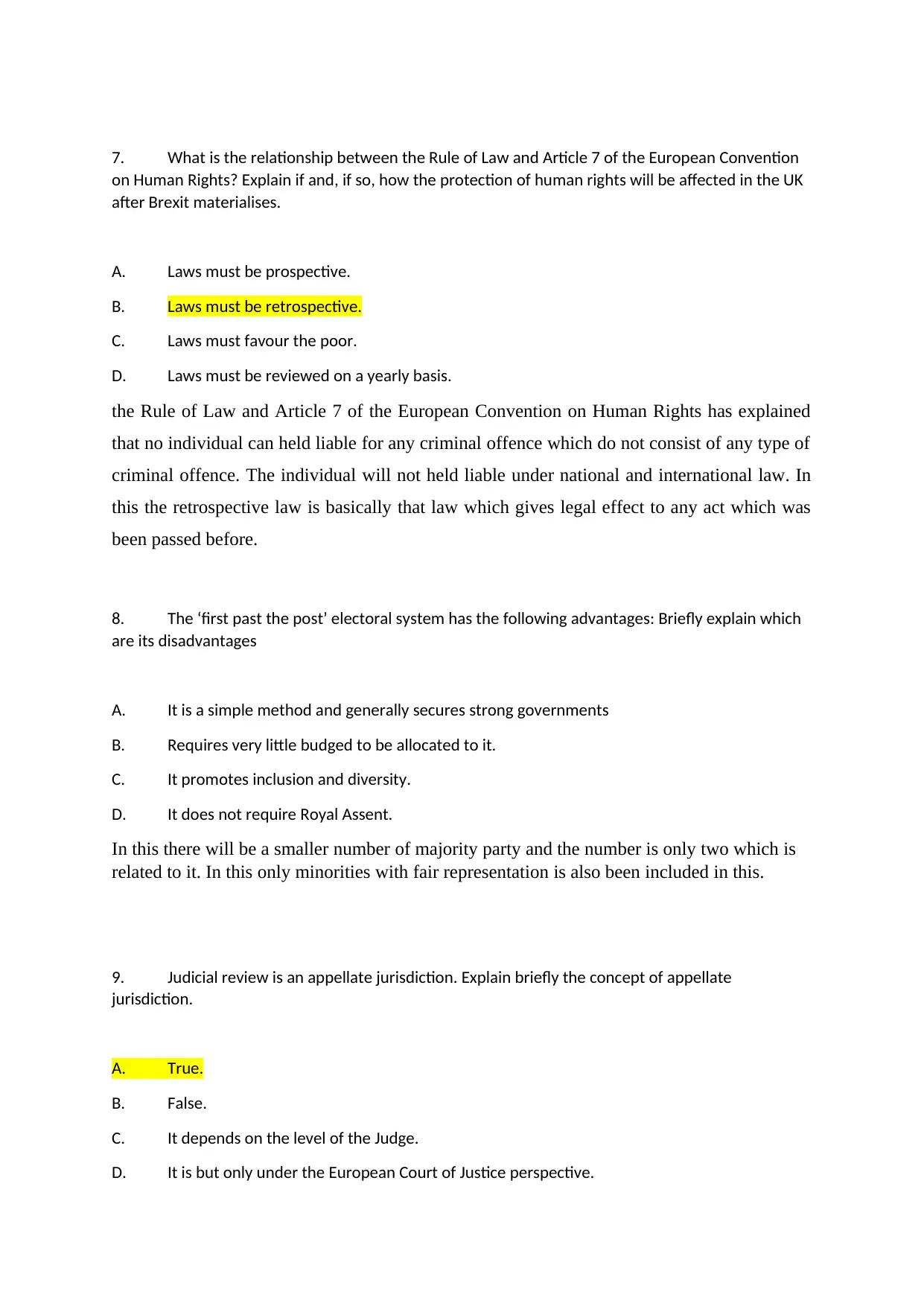
7. What is the relationship between the Rule of Law and Article 7 of the European Convention
on Human Rights? Explain if and, if so, how the protection of human rights will be affected in the UK
after Brexit materialises.
A. Laws must be prospective.
B. Laws must be retrospective.
C. Laws must favour the poor.
D. Laws must be reviewed on a yearly basis.
the Rule of Law and Article 7 of the European Convention on Human Rights has explained
that no individual can held liable for any criminal offence which do not consist of any type of
criminal offence. The individual will not held liable under national and international law. In
this the retrospective law is basically that law which gives legal effect to any act which was
been passed before.
8. The ‘first past the post’ electoral system has the following advantages: Briefly explain which
are its disadvantages
A. It is a simple method and generally secures strong governments
B. Requires very little budged to be allocated to it.
C. It promotes inclusion and diversity.
D. It does not require Royal Assent.
In this there will be a smaller number of majority party and the number is only two which is
related to it. In this only minorities with fair representation is also been included in this.
9. Judicial review is an appellate jurisdiction. Explain briefly the concept of appellate
jurisdiction.
A. True.
B. False.
C. It depends on the level of the Judge.
D. It is but only under the European Court of Justice perspective.
on Human Rights? Explain if and, if so, how the protection of human rights will be affected in the UK
after Brexit materialises.
A. Laws must be prospective.
B. Laws must be retrospective.
C. Laws must favour the poor.
D. Laws must be reviewed on a yearly basis.
the Rule of Law and Article 7 of the European Convention on Human Rights has explained
that no individual can held liable for any criminal offence which do not consist of any type of
criminal offence. The individual will not held liable under national and international law. In
this the retrospective law is basically that law which gives legal effect to any act which was
been passed before.
8. The ‘first past the post’ electoral system has the following advantages: Briefly explain which
are its disadvantages
A. It is a simple method and generally secures strong governments
B. Requires very little budged to be allocated to it.
C. It promotes inclusion and diversity.
D. It does not require Royal Assent.
In this there will be a smaller number of majority party and the number is only two which is
related to it. In this only minorities with fair representation is also been included in this.
9. Judicial review is an appellate jurisdiction. Explain briefly the concept of appellate
jurisdiction.
A. True.
B. False.
C. It depends on the level of the Judge.
D. It is but only under the European Court of Justice perspective.
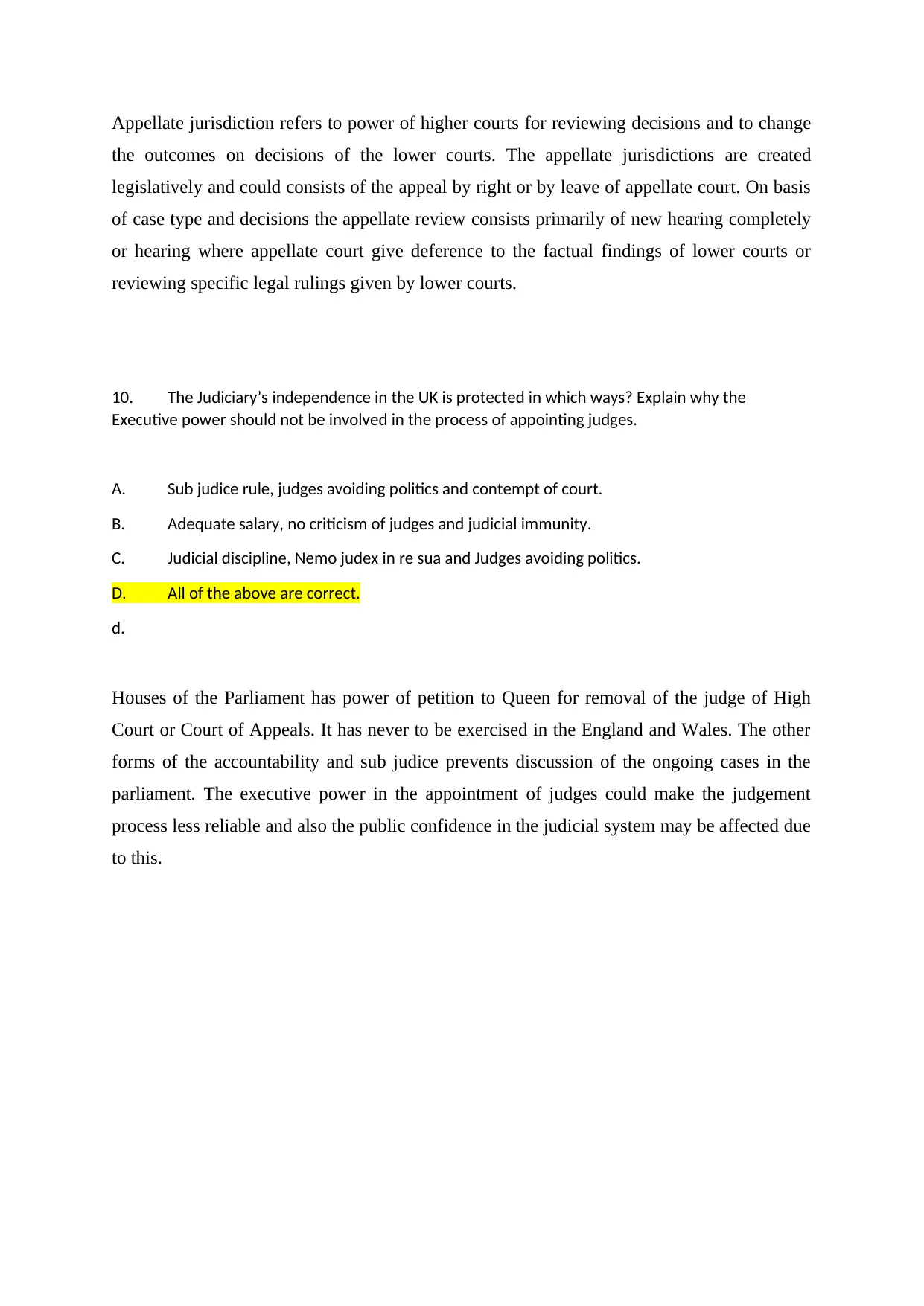
Appellate jurisdiction refers to power of higher courts for reviewing decisions and to change
the outcomes on decisions of the lower courts. The appellate jurisdictions are created
legislatively and could consists of the appeal by right or by leave of appellate court. On basis
of case type and decisions the appellate review consists primarily of new hearing completely
or hearing where appellate court give deference to the factual findings of lower courts or
reviewing specific legal rulings given by lower courts.
10. The Judiciary’s independence in the UK is protected in which ways? Explain why the
Executive power should not be involved in the process of appointing judges.
A. Sub judice rule, judges avoiding politics and contempt of court.
B. Adequate salary, no criticism of judges and judicial immunity.
C. Judicial discipline, Nemo judex in re sua and Judges avoiding politics.
D. All of the above are correct.
d.
Houses of the Parliament has power of petition to Queen for removal of the judge of High
Court or Court of Appeals. It has never to be exercised in the England and Wales. The other
forms of the accountability and sub judice prevents discussion of the ongoing cases in the
parliament. The executive power in the appointment of judges could make the judgement
process less reliable and also the public confidence in the judicial system may be affected due
to this.
the outcomes on decisions of the lower courts. The appellate jurisdictions are created
legislatively and could consists of the appeal by right or by leave of appellate court. On basis
of case type and decisions the appellate review consists primarily of new hearing completely
or hearing where appellate court give deference to the factual findings of lower courts or
reviewing specific legal rulings given by lower courts.
10. The Judiciary’s independence in the UK is protected in which ways? Explain why the
Executive power should not be involved in the process of appointing judges.
A. Sub judice rule, judges avoiding politics and contempt of court.
B. Adequate salary, no criticism of judges and judicial immunity.
C. Judicial discipline, Nemo judex in re sua and Judges avoiding politics.
D. All of the above are correct.
d.
Houses of the Parliament has power of petition to Queen for removal of the judge of High
Court or Court of Appeals. It has never to be exercised in the England and Wales. The other
forms of the accountability and sub judice prevents discussion of the ongoing cases in the
parliament. The executive power in the appointment of judges could make the judgement
process less reliable and also the public confidence in the judicial system may be affected due
to this.
⊘ This is a preview!⊘
Do you want full access?
Subscribe today to unlock all pages.

Trusted by 1+ million students worldwide
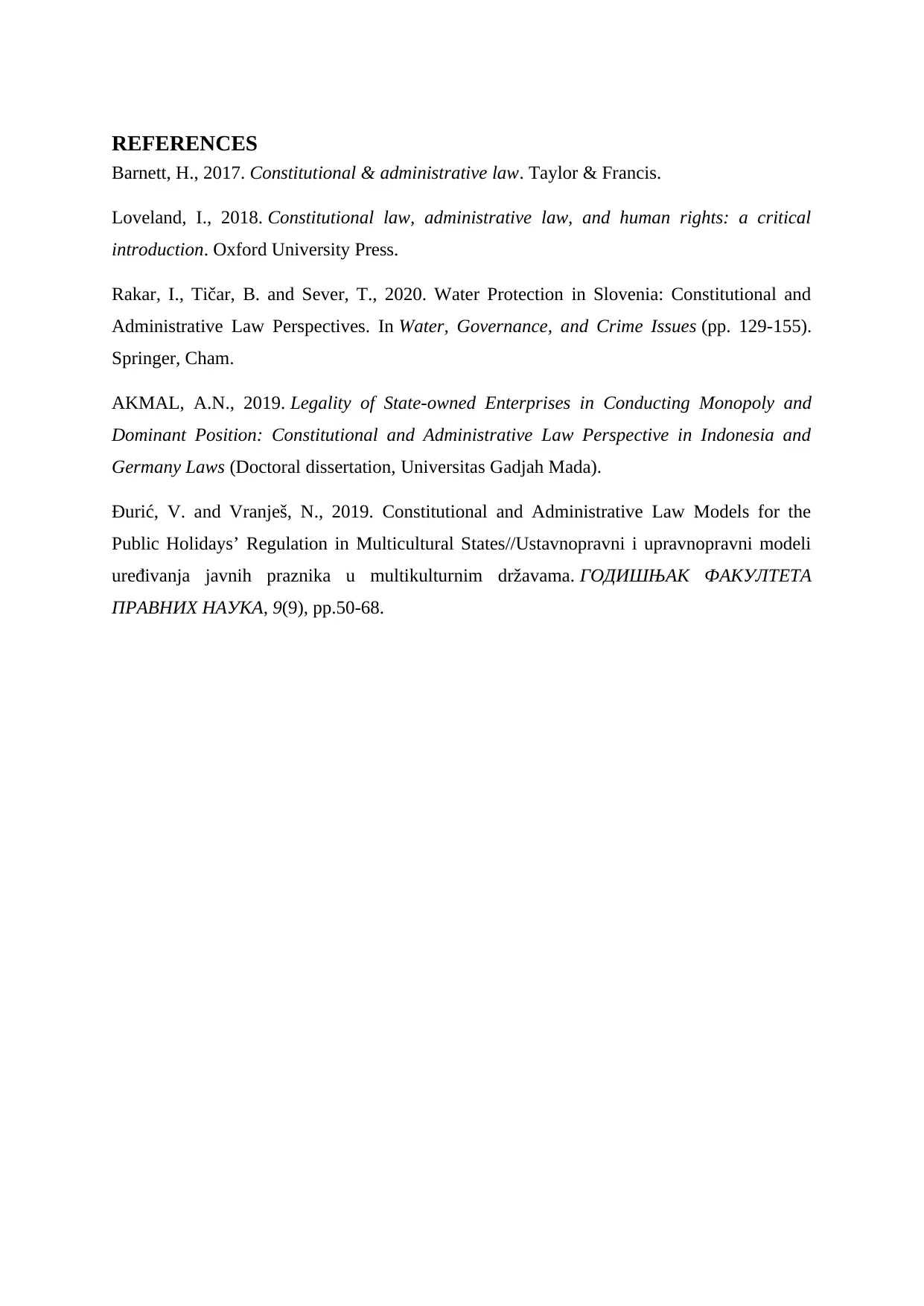
REFERENCES
Barnett, H., 2017. Constitutional & administrative law. Taylor & Francis.
Loveland, I., 2018. Constitutional law, administrative law, and human rights: a critical
introduction. Oxford University Press.
Rakar, I., Tičar, B. and Sever, T., 2020. Water Protection in Slovenia: Constitutional and
Administrative Law Perspectives. In Water, Governance, and Crime Issues (pp. 129-155).
Springer, Cham.
AKMAL, A.N., 2019. Legality of State-owned Enterprises in Conducting Monopoly and
Dominant Position: Constitutional and Administrative Law Perspective in Indonesia and
Germany Laws (Doctoral dissertation, Universitas Gadjah Mada).
Đurić, V. and Vranješ, N., 2019. Constitutional and Administrative Law Models for the
Public Holidays’ Regulation in Multicultural States//Ustavnopravni i upravnopravni modeli
uređivanja javnih praznika u multikulturnim državama. ГОДИШЊАК ФАКУЛТЕТА
ПРАВНИХ НАУКА, 9(9), pp.50-68.
Barnett, H., 2017. Constitutional & administrative law. Taylor & Francis.
Loveland, I., 2018. Constitutional law, administrative law, and human rights: a critical
introduction. Oxford University Press.
Rakar, I., Tičar, B. and Sever, T., 2020. Water Protection in Slovenia: Constitutional and
Administrative Law Perspectives. In Water, Governance, and Crime Issues (pp. 129-155).
Springer, Cham.
AKMAL, A.N., 2019. Legality of State-owned Enterprises in Conducting Monopoly and
Dominant Position: Constitutional and Administrative Law Perspective in Indonesia and
Germany Laws (Doctoral dissertation, Universitas Gadjah Mada).
Đurić, V. and Vranješ, N., 2019. Constitutional and Administrative Law Models for the
Public Holidays’ Regulation in Multicultural States//Ustavnopravni i upravnopravni modeli
uređivanja javnih praznika u multikulturnim državama. ГОДИШЊАК ФАКУЛТЕТА
ПРАВНИХ НАУКА, 9(9), pp.50-68.
1 out of 10
Related Documents
Your All-in-One AI-Powered Toolkit for Academic Success.
+13062052269
info@desklib.com
Available 24*7 on WhatsApp / Email
![[object Object]](/_next/static/media/star-bottom.7253800d.svg)
Unlock your academic potential
Copyright © 2020–2026 A2Z Services. All Rights Reserved. Developed and managed by ZUCOL.




